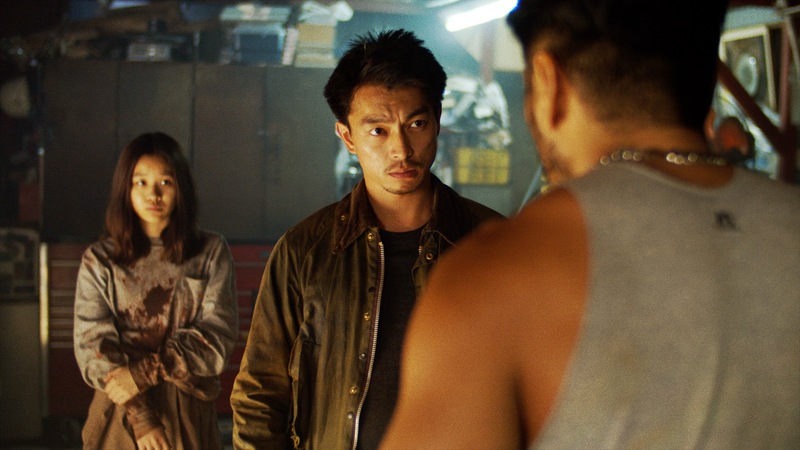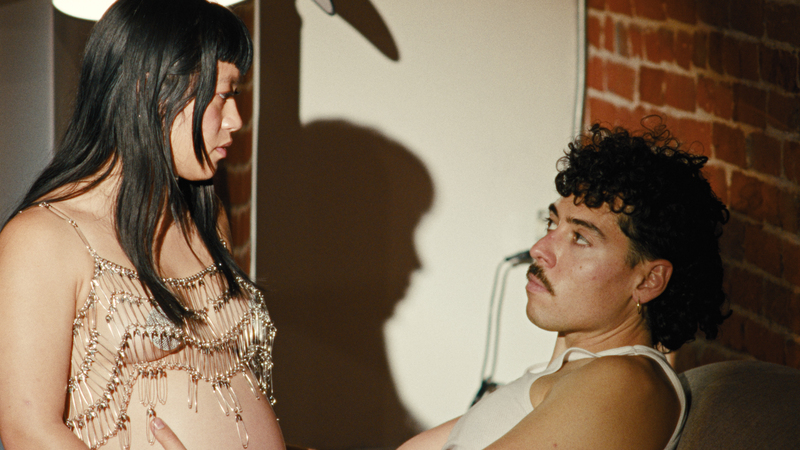
The Price of Protection Is Never Paid Once
MOVIE REVIEW
Tatsumi
–
Genre: Crime, Thriller, Drama
Year Released: 2025
Runtime: 1h 48m
Director(s): Hiroshi Shoji
Writer(s): Hiroshi Shoji
Cast: Yuya Endo, Kokoro Morita, Goro Sato, Takenori Goto
Where to Watch: coming to VOD & digital platforms November 14, 2025
RAVING REVIEW: TATSUMI opens in a corner of the underworld most films only mention in whispers: the person who shows up after the violence to clear the scene. That detail immediately tells you what kind of story this is—less about the swaggering side of organized crime and more about the residue it leaves on people who never get a headline. Tatsumi is a fisherman by day and a cleaner for local yakuza by night, a man whose life is defined by proximity to the worst moments of other people’s choices. When his ex-girlfriend is murdered and her teenage sister Aoi charges headlong toward payback, he steps in—partly out of guilt, partly out of duty, and partly because he recognizes a path that can only end one way.
Hiroshi Shoji keeps the film close to the heart. There’s no fetishizing of gangster life here; the frame is packed with concrete, sweat, and the light of places where people do things they don’t want remembered. The film's best decision is to prioritize the bond between Tatsumi and Aoi. He understands the cost of violence, not in a grand philosophizing way but as a man who’s had to wipe it off walls. She’s all forward motion, stubborn and combustible, too young to believe in limits and too hurt to care. Their scenes together are the spine of the movie: he tries to corral chaos using rules learned from cleaning up after it, while she treats every rule like another lie the world is telling her.
Yuya Endo plays Tatsumi with a weary stillness that never falls into self-pity. You always sense the calculations going on behind his eyes—how to get them out, how to avoid escalating, how to make the least bad choice when nothing good is available. Kokoro Morita gives Aoi a raw immediacy that keeps the film from sinking into routine vengeance. She can be infuriating and heartbreaking in the same scene, and the performance sells why Tatsumi sticks around even when it’s clear he’s in over his head. Together, they create the feeling of two people improvising a partnership because the world has given them no other option.
Shoji’s approach to violence carries weight. When it erupts, it hurts. There’s no stylish catharsis; there’s mess, noise, and the quiet that follows. That refusal to romanticize bloodshed places TATSUMI closer to the street-level traditions of older yakuza dramas, which emphasized consequences over “cool”. The film also understands that revenge is not a strategy; it’s a tremor that keeps your hands shaking when you need them steady. Aoi’s resolve is moving because it’s built on love, but the movie wisely shows the way grief can disguise itself as clarity. She’s chasing a future that can’t exist, and every step toward it puts her further from the one person trying to bring her back.
There’s a push-pull at play between Shoji’s restraint and the genre machinery he’s operating. The film seeks to reject the fireworks that often accompany these stories, instead focusing on fear, exhaustion, and the moral hangover of violence. At the same time, it builds to a reckoning that needs escalation to feel inevitable rather than merely scheduled. When we arrive there, the emotional logic lands—these people were always headed for a wall—but the moment doesn’t quite hit with the force the setup promises. It feels honest, just not fully earned by momentum.
The film’s integrity lends it lasting appeal. TATSUMI is interested in the ethics of caretaking inside a broken world. The lead character’s day job—making horror disappear for money—mirrors the larger lie of the underworld, where everyone pretends consequences can be buried if the surface is polished enough. His decision to guide and protect Aoi is a rejection of that lie; it’s the one part of his life where cleaning up means facing what happened instead of erasing it. The movie’s quiet tragedy is that he’s spent so long disinfecting other people’s sins that he no longer believes he deserves anything clean himself.
A useful framing for the movie is to think of it less as a revenge thriller and more as a mentorship story in hostile conditions. Tatsumi teaches Aoi to survive, not to win. He knows that surviving often looks like losing to anyone keeping score on pride. The film’s most affecting scenes push both characters to recognize that distinction. In those moments, the genre elements fall away, and what’s left is the story of a guardian who’s only good at preventing disasters and a young woman who refuses to measure life by the catastrophe avoided.
TATSUMI accomplishes something important: it drains the fantasy out of vengeance without draining the feeling. The film allows you to sit with anger, then shows how unchecked anger can perpetuate harm. It’s not a sermon; it’s a walk through neighborhoods where mercy is in short supply and people mistake toughness for truth. By the time the dust settles, the movie has argued, quietly but firmly, that the hardest work a person can do is refuse to become the thing they’re fighting.
As a whole, this is a solid, unglamorous entry in the yakuza tradition—more bruise than brutal, more sorrowful than shocking. The filmmaking is modest but confident, the leads carry real weight, and the core relationship gives the story a beating heart. It may not reinvent the genre, but it leaves you with a knot in your chest that’s hard to brush off. That’s worth something.
Please visit https://linktr.ee/overlyhonestr for more reviews.
You can follow me on Letterboxd, Instagram, Twitter, and YouTube. My social media accounts can also be found on most platforms by searching for 'Overly Honest Reviews'.
I’m always happy to hear from my readers; please don't hesitate to say hello or send me any questions about movies.
[photo courtesy of MNIBUS ENTERTAINMENT]
DISCLAIMER:
At Overly Honest Movie Reviews, we value honesty and transparency. Occasionally, we receive complimentary items for review, including DVDs, Blu-rays, CDs, Vinyl Records, Books, and more. We assure you that these arrangements do not influence our reviews, as we are committed to providing unbiased and sincere evaluations. We aim to help you make informed entertainment choices regardless of our relationship with distributors or producers.
Amazon Affiliate Links:
Additionally, this site contains Amazon affiliate links. If you purchase through these links, we may receive a commission. This affiliate arrangement does not affect our commitment to honest reviews and helps support our site. We appreciate your trust and support in navigating these links.



Average Rating